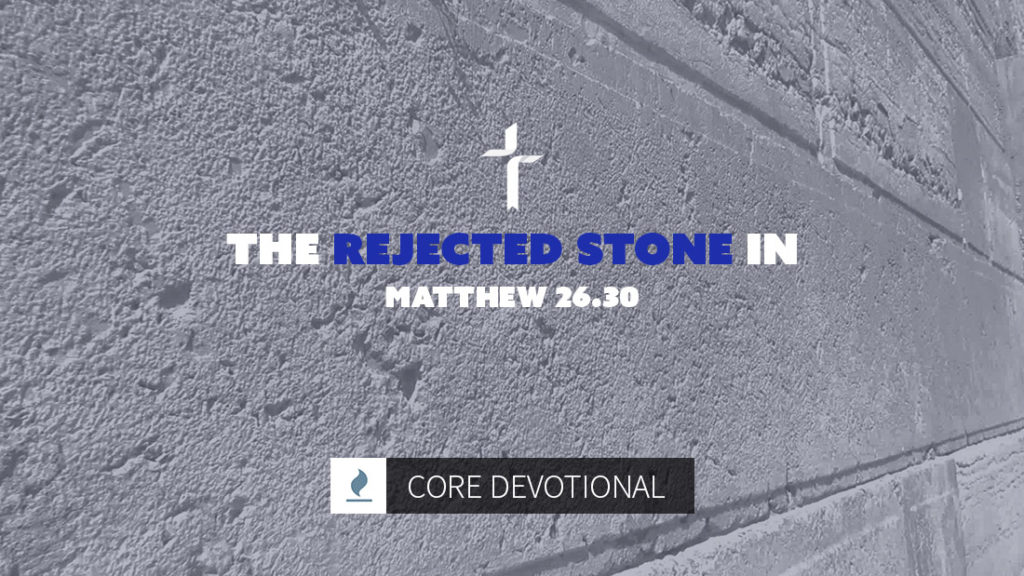In Matthew 26 Jesus celebrates His final Passover meal with His disciples (17-29). On that very night Jesus will be betrayed, abandoned, and arrested. During the Passover meal Jesus explains to His disciples that the Passover is being perfectly fulfilled by His own, upcoming, voluntary sacrifice of Himself as the perfect Lamb of God.
The bread they were eating represented His body (26), and the wine they were drinking portrayed His “blood of the covenant, which is poured out for many for the forgiveness of sins” (27-28). In verse 30 we are told “And when they had sung a hymn, they went out to the Mount of Olives” (cf. Mark 14:26-31). Here we have the record of a beautiful moment in which Jesus and His beloved disciples share in fellowship with a song of praise to God.
Have you ever wondered what last hymn Jesus sang with His disciples? Since they were celebrating Passover we can be pretty certain that they would have sung Psalm 118. It was traditional for the Jewish people to sing Psalms 113-118 during the course of the Passover meal.
These Psalms were composed to commemorate the delivery of the Jewish people from their bondage of slavery in Egypt. They are designated as the Hallel and are songs of praise for God’s love, faithfulness, and salvation. The first two Psalms (113-114) were sung at the beginning of the Passover meal and the four remaining (115-118) at the end of the meal. Thus Jesus and His disciples would have concluded their Passover celebration by singing Psalm 118.
I think it is an incredible blessing to know what the last song was that Jesus would have sung before His death on the cross. And, when we read Psalm 118 with this knowledge, what a powerful psalm this becomes! Psalm 118 is quoted quite frequently in the New Testament, and there are so many amazing things about the psalm especially when we realize that Jesus sang it after this Passover meal and just before His passion. This is a great Psalm to preach through but I cannot exposit all of the greatness of it here so I want to focus on one profound verse while keeping Matthew 26:30 in view.
Psalm 118: 22 says, “The stone the builders rejected has become the chief cornerstone.” As Jesus sang this specific verse I tremble to even think about what Jesus was thinking and feeling as these words must have cut to the very core of His human and divine being. The Apostle Peter states twice in the New Testament that Jesus is indeed the chief cornerstone (Acts 4:11; 1 Peter 2:7) quoting Psalm 118.
I am sure that Peter, in writing those words by the inspiration of the Holy Spirit, remembered vividly that last Passover meal when they (the disciples) and Jesus had sung that verse. How powerfully moving that must have been for Peter; especially knowing that he himself had been one of those who had rejected Jesus. Jesus was sure to be rejected and certainly knew it as He was singing that verse.
Judas had already left to betray Jesus (26: 21-25; cf. 47-50). All of the disciples would abandon him (26:56), and even His chief apostle Peter would deny His Lord three different times (26: 69-75). The most significant and terrible rejection however would be that God the Father would abandon His own beloved son on the cross.
This is the point in which we must be so very careful for we are truly treading on holy, holy, holy, ground. After all of the horror of the trial, beating, and insults, Jesus was crucified, and on the cross God poured out His wrath on God the Son, causing Him to cry out “My God, My God, why have you forsaken me?”(27: 46). When we read Psalm 118 in light of Matthew 26:30 I hope we will truly understand in a more profound manner, what our Messiah Jesus did for us and I pray that we will be genuinely thankful as we praise (boast), and worship (make our hearts prostrate) before our blessed Savior and Lord who alone is worthy of all glory and honor.


